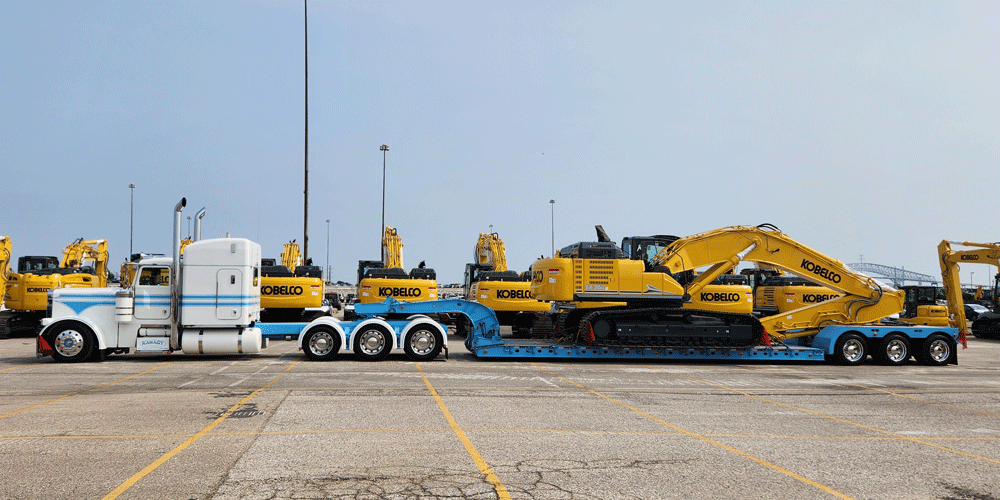Why Boycotting Cheap Freight Hurts You, Your Carrier and the Industry as a Whole
Brittany is a specialized operations manager who oversees eight driver managers and 257 drivers. In her role, she manages fleet productivity and ensures she’s leading both her employees and drivers to success. She loves working for ATS because of the difference the company makes in everyone’s lives. She appreciates the ATS atmosphere, where everyone genuinely cares about each other and works together as a team. Prior to working at ATS, she worked with technicians and customers learning the maintenance side of the transportation industry.
Have you ever been tempted to “boycott” freight? Or reject every load offer you get? Maybe you think the freight is too cheap, the company is skimming off the top or the load simply isn’t worth hauling.
Chances are, you’ve encouraged others to boycott this freight as well. Maybe if you all boycott cheap freight, you’ll get the market to turn. Right?
Not necessarily.
It’s understandable you feel this way. You’re upset that the rates aren’t what they used to be. You want to fight back. Strength in numbers, right?
But by boycotting freight, you’re doing yourself far more harm than good. To keep moving, other drivers will haul the freight you reject. Boycotting freight also harms the carrier you work for. If a trucking company can’t cover the contracted freight they’re guaranteed, they can pull the contracts and choose another carrier that will cover their freight.
Let’s be clear from the start: You can certainly say no to load offers. It’s in your best interest to haul loads that will help you support your business. But there’s a difference between saying no to the occasional load and boycotting freight entirely
Anderson Trucking Service (ATS) has been around for over 65 years — so we know a thing or two about the market and how it ebbs and flows. It’s our job to help you succeed so you can support yourself and your family.
Boycotting cheap freight — or any freight at all — isn’t the way to make market rates change. If you constantly reject load offers, you’ll struggle to succeed. In fact, it’ll hurt you and the carrier you’re driving for. Let’s learn a little more about why and what you can do instead.
Why Do Drivers Boycott Freight?
So, why are drivers “boycotting” freight? What are they hoping to accomplish?
For starters, rates have dropped significantly since mid-2022. Drivers who were used to hauling freight for $2.50 per mile could be hauling it for $1.80. This is extremely frustrating for drivers, and understandably so. The rates may be lower than they were during the spot market boom during the pandemic, but they’re still higher than they were pre-pandemic.
Drivers aren’t just boycotting any kind of freight; they’re boycotting what they define as cheap freight. They’re hoping that by doing so, they can get market rates to turn.
Because our nation values strength in numbers, the belief is that if a lot of drivers pull together and refuse to haul cheap freight, carriers and customers have to listen. Then, they’ll have no other option but to raise freight rates. By boycotting freight, some drivers may be hoping to start a movement. Unfortunately, in this situation, drivers don’t have the upper hand.
This strategy doesn’t have the effect drivers are hoping for. If you continue to boycott freight or turn load offers down if the freight is priced too low, you’ll only hurt yourself. Another driver will always be willing to haul the freight you won’t.
On the other hand, some drivers refuse to haul freight because they think the company they drive for is skimming money off the top of their rate or internalizing funds. By boycotting that freight, they hope that carriers will change their tune and give drivers the full rate.
Carriers should certainly never be skimming off the top of the rate. If you’re concerned your carrier is doing this to you, ask your carrier if you can see the freight bills that are sent to the customer. ATS doesn’t skim off the top and we’ll show you the freight bills to prove it.
Related: Understanding good, fair pay
How Does Freight Boycotting Hurt You?
Instead of helping you, freight boycotting actually hurts you. In a nutshell, it’ll cause you to run fewer miles, receive fewer load opportunities and make less money overall. This can spark a lot of anger and frustration — especially when drivers who are boycotting cheap freight are hoping to increase their pay.
That lack of revenue can hurt you big time and lead to long-term consequences for you and your driver livelihood. You could end up in serious debt and even lose your truck.
Some drivers will leave the industry altogether.
How Does Freight Boycotting Hurt the Carrier?
Freight boycotting has harmful consequences for trucking carriers. If a lot of drivers in the fleet decide to boycott customer freight, who’s going to haul that freight? Sure, another driver may pick up the load, but by that time, will the load be picked up and still delivered on time?
Customers want to work with reliable carriers with a high on-time delivery percentage. If a carrier can’t promise that or the carrier’s drivers simply won’t haul their freight any longer, the customer will find a different carrier that will service them.
Customers choose carriers with the best level of service, and they have a lot of carriers they can choose from. Your reputation as a carrier follows you. If, as a carrier, you’ve been known to have problems getting freight delivered, that customer may never work with you again.
Carriers can lose customers left and right this way. Some drivers might be thinking, good riddance, they weren’t paying anyway! But consider this: Some freight is better than no freight, even if it’s what you consider cheap. Carriers need customers to fill in the gaps between low-load areas. Those lanes may pay less, sure, but they can get you into better market areas with higher-paying freight.
In turn, all the drivers in the fleet will be negatively affected. There will be less freight to go around, and, as a result, less revenue for each driver.
Boycotting freight doesn’t just hurt you, it hurts everyone at your carrier — including your fellow drivers.
Change Your Outlook
It can be tempting to boycott freight, deny any load offer that doesn’t pay above a certain amount and sit around waiting for a better offer. However, you have to consider how that’ll affect you in the long run and if it’ll actually benefit you.
You also have to consider that the person giving you load offers — a driver manager or a dispatcher — has your best interest in mind. They’re selecting freight to help you succeed financially.
If you deadhead hundreds of miles to haul a “better” load, you’ll eat the cost of fuel. And if you continue to sit day after day boycotting freight, you’re not covering your daily costs. Even when you’re not running the truck, it’s incurring expenses. You have daily costs to think about — including your truck payment, a maintenance account, insurance costs, fuel and food on the road.
Just because you stop moving, it doesn’t mean your truck payments stop. You can get into a huge hole by denying load offers. You can end up so far in the hole that you won’t take home a paycheck for weeks.
Taking a load that covers your daily costs is better than taking no load. Even earning $100 on a load is better than earning nothing. If you sit one day, you can set yourself back an entire week.
It’s understandable to be frustrated by a load offer that just barely covers the cost of fuel. However, that load may have been offered to you by your driver manager because it gets you into a better freight area.
If you aren’t sure how to calculate your cost per mile or determine how much it costs per day to run, it’s time to figure it out. These tips will give you some perspective and help you learn how to calculate your costs.
How to Navigate the Market
Rates are lower than they used to be, sure, but that doesn’t mean boycotting freight is the answer.
It can seem like strength in numbers will make the market turn or your carrier change their rates, but unfortunately, that isn’t how it works. Another driver will choose to haul the freight you reject.
In every industry, there are ebbs and flows. The rates may be frustrating now, but the market will take off again. We’ve seen it happen time and time again. It’s worth it to hang on. When the market goes up again, you’ll have more experience and more miles under you.
For tips on how to ride that wave, check out these market tips from a seasoned ATS driver.


